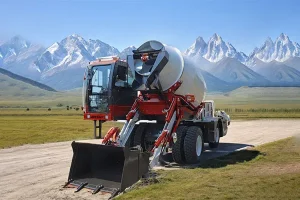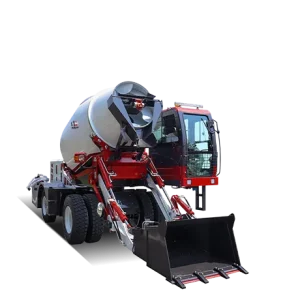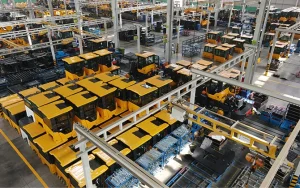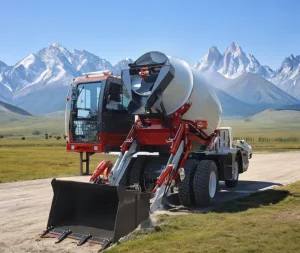Avoid your inquiry is delay response, please enter your WhatsApp/Skype along with the message, so we can contact you at the very first time.
We will reply you within 24 hours. If for urgent case, please add WhatsApp/WeChat: +86 16652801818,. Or call +86 16652801818 directly.
*We respect your confidentiality and all information are protected. We will only use your information to respond to your inquiry and will never send unsolicited emails or promotional messages.
Facing project delays due to unreliable concrete delivery? Struggling with inconsistent mix concrete quality or high costs from third-party suppliers? Imagine having dependable, high-performance concrete mixer trucks ready to deliver precisely what you need, when you need it, maximizing uptime and control.
A concrete mixer truck, often called a concrete truck or cement truck, is specialized heavy duty truck designed to transport ready-mix concrete from a batch plant to a job site. Its key feature is a rotating drum ( mixer or mixing drum) that continuously agitates the pre-mixed material, preventing setting during transit and ensuring uniform consistency upon arrival. Selecting the right truck involves considering capacity, discharge type, and chassis specifications.

Concrete Mixer Truck
As a dedicated Construction Equipment Manufacturing plant, we don’t just build machinery; we engineer solutions that drive productivity and profitability for demanding industries. We understand that for our core customers – Construction Contractors, Farmers & Agri Dealers managing large properties, Landscaping & Forestry Companies undertaking significant projects, Machinery Rental Companies supplying reliable fleets, and Government/Public Tenders requiring dependable equipment – the machinery they invest in must perform. When it comes to concrete mixer trucks, the priorities are crystal clear: Durability & Reliability, Ease of Use & Features, substantial Load Capacity, and the undeniable strength of the power system. Downtime isn’t just an inconvenience; it’s lost revenue and potentially compromised project timelines. This guide delves into the world of concrete mixer trucks, exploring the types, features, and considerations crucial for making an informed investment, whether you’re looking at new and used options.
At its core, a concrete mixer truck is a purpose-built vehicle combining a heavy-duty truck chassis with a specialized concrete mixer body. The most iconic feature is the large, rotating drum mounted on the rear or, less commonly, the front. This mixing drum is fitted with internal blades or fins. As the drum rotates one way, it continuously tumbles and mixes the aggregate, cement, sand, and water, keeping the concrete pliable. Reversing the drum’s rotation pushes the mix concrete out via a controllable chute system for placement.
These trucks are distinct from standard dump trucks or roll off trucks. They are specifically engineered to handle the immense weight and dynamic load of wet concrete. The chassis itself is typically reinforced, often featuring multiple axles (like 6×4 or 8×4 configurations) to distribute weight legally and effectively. The mixer unit includes the drum, drive mechanism (usually hydraulic), water tank (for mix adjustment and cleanup), controls, and the delivery chute. Understanding these fundamental components is the first step in appreciating the engineering that goes into these essential construction vehicles.
In the demanding environments where concrete mixer trucks operate – bustling construction sites, rugged farm terrains, or high-utilization rental fleets – Durability & Reliability are not just desirable; they are non-negotiable. A breakdown doesn’t just mean one truck is out of commission; it can halt concrete delivery, delay pours, impact crew schedules, and incur significant costs in lost time and potential repairs. For Construction Contractors, this means potentially missing project milestones. For Farmers using concrete for infrastructure or Agri Dealers supplying them, reliability ensures projects stay on track. Rental Companies stake their reputation on providing dependable equipment.

The self-loading concrete mixer truck is powered by a robust 91/92 kW engine (4108 or 6105 models) and features a 280/315 separated gearbox with a 2.5T drive axle for smooth torque transmission. With a top speed of 25 km/h and a 4×4 traction system, it excels in off-road conditions. The 16/70 R22.5 double tires ensure superior stability and traction, making it ideal for remote job sites and rural infrastructure projects. This combination of power, durability, and adaptability guarantees efficient performance in demanding construction environments.
With a 3.3 m³ mixing capacity and 0.65 m³ batch volume, this mixer truck ensures efficient production. Its 1:28 reduction ratio and ≥15 laps/min speed enable rapid, uniform mixing. The HL6F-82700 reducer ensures durability, while the 7670×2800×3200 mm compact design enhances maneuverability. Weighing 9500 kg, it balances payload and mobility, making it ideal for contractors seeking high output and precision.
This mixer truck features a heavy-duty chassis, 4×4 traction, and a 3200 mm wheelbase for stability. Its 6760×2800×4100 mm extended frame enhances durability, while the double-tire setup reduces ground pressure. Easy-to-maintain components, including a domestic reducer, lower lifecycle costs. Ideal for construction, mining, and agriculture, it ensures reliability and efficiency.
The heart of any concrete mixer truck is its power system – the engine and drivetrain responsible for moving the massive weight and powering the mixer‘s hydraulic system. Given the demanding nature of the work, these trucks rely on powerful, high-torque diesel engines.
| Machine size (mm) | 6760×2800×4100(Lifting arm) 7670×2800×3200(Drop arm) |
| Wheelbase (mm) | 3200 |
| Total weight(kg) | 9500 |
| Engine | 4108 Supercharged/6105 supercharged countryll |
| Power (kw) | 91/92 |
| Gearbox | 280/315 Separated type |
| Drive axle | 2.5 Twheel side deceleration Bridge |
| Tires | 16/70R22.5 Double tire |
| Bucket capacity (m³) | 0.65 |
| Mixing capacity (m³) | ≥3.3 |
| SAWMILL | 1:28 |
| Rotating speed(laps/minute) | ≥15 laps/minute |
| Reducer | HL6F-B2700 Made in China |
| Travel speed (km/h) | 25 |
| Axle number traction type | 4×4 |

As manufacturers, we carefully select and integrate engine and drivetrain components to ensure optimal performance, fuel economy, and, critically, Reliability. The power system must be robust enough to handle the truck‘s GVWR plus the demanding, continuous power draw from the hydraulic system operating the mixing drum. Our Concrete Mixing Plants rely on similarly robust power principles.
Concrete mixer trucks primarily come in two discharge configurations: rear discharge and front discharge. Each has distinct advantages impacting Ease of Use and suitability for different applications.
The choice depends heavily on operational preferences and typical job site conditions. High-volume ready mix operations often favor front discharge for efficiency and safety, while Construction Contractors or Rental Companies might opt for the versatility and familiarity of rear discharge models. We manufacture components suitable for both types, understanding the unique demands of each configuration.
Volumetric Mixers: Flexible On-Site Concrete Production Explained?
A volumetric concrete mixer (or volumetric mixer) represents a different approach to concrete delivery. Unlike traditional mixer trucks that transport pre-mixed concrete from a batch plant, a volumetric truck carries the individual components – sand, aggregate, cement, and water – in separate compartments.
These materials are then metered and mixed on-site to produce fresh concrete exactly when and where it’s needed. This offers several key advantages:

Concrete Mixer Truck
While volumetric concrete mixers typically have a lower instantaneous discharge rate than large drum mixers, their flexibility makes them highly cost-effective for Construction Contractors doing varied jobs, utility work, remote Farmers, or Rental Companies serving customers needing small quantities or precise control. These metered concrete trucks offer a unique solution focused on efficiency and waste reduction.
Self-loading concrete mixers are another specialized category, particularly useful in specific scenarios. These machines combine the functions of a wheel loader, a batching plant, and a traditional concrete mixer truck into a single unit. They feature a front-mounted bucket (hopper) that scoops up aggregate and sand, lifts it, and discharges it into the mixing drum. Cement (often from bags) and water are added, and the truck mixes the concrete as it travels or while stationary, then discharges it via a chute.
Key benefits include:
However, their concrete production output is generally lower than conventional trucks or volumetric mixers. They are best suited for projects requiring relatively small quantities of concrete poured intermittently or in locations where self-sufficiency is paramount. Farmers & Agri Dealers might find them useful for remote fence posts or foundation work, while Landscaping & Forestry Companies could use them for remote path or structure installations. Our expertise extends to understanding the mechanics of various Crushing & Screening equipment, which shares principles with aggregate handling in these mixers.
Beyond the core function of mixing and transporting concrete, several Features significantly impact Ease of Use and operator efficiency – crucial factors for busy crews and Rental Companies:
As manufacturers, we focus on incorporating these user-centric features, knowing that an easy-to-operate and maintain truck leads to higher productivity and operator satisfaction. Consider exploring our Concrete Pump Trucks which also emphasize operator efficiency.
Consistent, proactive maintenance is the key to maximizing the Durability & Reliability of any concrete mixer truck, whether new or used. Neglecting maintenance leads to breakdowns, costly repairs, and shortened service life. Key areas include:
Adhering to a strict maintenance schedule, as outlined by both the truck chassis and concrete mixer manufacturers (like McNeilus or Stetter for mixers), is the best way to protect your investment and ensure your truck is always ready for the next job site. Our Spare Parts division understands the importance of timely component replacement.
For Construction Contractors, Farmers & Agri Dealers, Landscaping & Forestry Companies, Machinery Rental Companies, and Government/Public Tenders, partnering directly with a Construction Equipment Manufacturing plant like ours offers distinct advantages when sourcing concrete mixer trucks or other heavy machinery:
We are committed to producing high-performance, reliable concrete mixer trucks designed to meet the specific priorities of businesses like yours. We don’t just sell trucks; we provide engineered solutions built for demanding work.
Ready to enhance your fleet’s efficiency and reliability with a concrete mixer truck built to perform?
Contact us today to discuss your specific requirements. Whether you need a single rugged mixer for diverse contract work, a fleet of dependable trucks for your rental inventory, or specialized units for agricultural or forestry applications, our expertise as a Construction Equipment Manufacturer ensures you get the right machine for the job. Let’s build a productive partnership.
What is the average lifespan of a well-maintained concrete mixer truck?
With proper maintenance and timely refurbishment (like drum replacement), a quality concrete mixer truck can often last 10-15 years or even longer in terms of the mixer body, while the truck chassis lifespan aligns with typical heavy duty truck expectations, often requiring replacement or major overhaul sooner depending on mileage and usage intensity. Durability is key.
Can you use a standard dump truck chassis for a concrete mixer?
No, typically not without significant modification. Concrete mixer trucks require specially prepared, reinforced chassis designed to handle the high center of gravity, dynamic shifting load of wet concrete, and the continuous power take-off (PTO) demands of the hydraulic mixer drive. Standard dump truck chassis usually lack the necessary frame strength and PTO provisions.
How much concrete does a typical ready mix truck hold?
Capacity varies significantly based on axle configuration and local laws. A standard rear discharge truck might hold 8-10 cubic yards. Larger trucks, often 8×4 configurations possibly with a tag axle, especially front discharge mixers, can legally carry 10-12 cubic yards or sometimes more in certain regions. Volumetric mixers carry materials to produce a variable amount on-site.
What are the main differences between a concrete mixer truck and a concrete pump truck?
A concrete mixer truck transports and mixes concrete, discharging it via a chute. A concrete pump truck receives mixed concrete (often from a mixer truck) and uses a powerful pump and articulated boom to place the concrete precisely at height or over long distances where the chute cannot reach. They serve different, often complementary, functions in concrete delivery and placement. Check out our specialized Concrete Pump Trucks.
Is buying a used concrete mixer truck a good option?
Buying a used concrete mixer truck can be cost-effective, but requires careful inspection. Key areas to check include the condition of the mixing drum and fins (wear/thinness), the hydraulic system (leaks, pump noise), the truck chassis (engine hours, maintenance records, rust), and the tires/brakes. Factor in potential refurbishment costs. Look for reputable dealers or sellers providing detailed histories.
How often does the mixing drum need to be replaced?
The lifespan of a mixing drum depends heavily on usage intensity, the abrasiveness of the aggregate used, and how well it’s cleaned. In high-volume ready mix operations, a drum might need replacement every 5-7 years, while in lower-use applications, it could last significantly longer. Regular inspection for wear is essential.